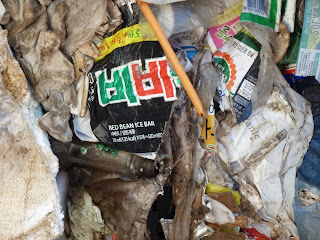Chemical Safety Advocates Laud Global Effort to Eliminate PCBs
Quezon City, Philippines/Bali, Indonesia. Civil society groups promoting chemical safety welcomed the launch today of a global mechanism that will help the Philippines and other countries address a highly toxic industrial chemical pollutant called PCBs or polychlorinated biphenyls.
The EcoWaste Coalition, Global Alliance for Incinerator Alternatives and the International POPs Elimination Network lauded the launch of the PCBs Elimination Network (PEN) at the start of the simultaneous extraordinary meetings of the Conferences of Parties to the Basel, Rotterdam and Stockholm Conventions in Bali, Indonesia.
“The launch of PEN will complement and bolster our ongoing effort in the Philippines to safely manage and eliminate our own stockpiles of PCB oils and contaminated equipment such as electric transformers and capacitors,” said Manny Calonzo of the EcoWaste Coalition and the Global Alliance for Incinerator Alternatives.
“The current public-private partnership to establish a closed-loop non-combustion facility, with support from the United Nations, to destroy the country’s stockpiles will be our best contribution to the global movement to purge the planet of PCBs,” he added.
Data from the Department of Environment and Natural Resources show that the Philippines has 6,879 tonnes of PCB containing equipment and wastes comprising about 2,400 tonnes of PCBs oil. The global estimate for PCBs is 5 million tonnes.
“The formation of PEN should assist developing countries and countries with economies in transition who lack financial and technical resources to identify, contain and destroy or irreversibly transform PCB wastes both in closed uses such as transformers and in open applications like paints and sealants,” said Alan Watson, IPEN representative to PEN and chair of PEN’s disposal working group.
PEN is a collaborative arrangement that seeks to promote the environmentally sound management (ESM) of oils and equipment containing or contaminated with PCBs in line with the goals and requirements of the Stockholm Convention on Persistent Organic Pollutants (POPs).
PEN will facilitate information exchange on the ESM of PCBs, promote research, technical assistance and technology transfer, foster networking and cooperation, raise awareness on successful ESM activities and establish annual awards for contributions to the ESM of PCBs.
According to the UN Environment Program, developing countries and countries with economies in transition suffer from the lack of capacities, poor inventories, limited resources and inaccessible information to ensure ESM of their PCBs.
For more information, please log on to:
http://chm.pops.int/Programmes/PCBs/PCBsEliminationClubPEC/tabid/438/language/fr-CH/Default.aspx
The EcoWaste Coalition, Global Alliance for Incinerator Alternatives and the International POPs Elimination Network lauded the launch of the PCBs Elimination Network (PEN) at the start of the simultaneous extraordinary meetings of the Conferences of Parties to the Basel, Rotterdam and Stockholm Conventions in Bali, Indonesia.
“The launch of PEN will complement and bolster our ongoing effort in the Philippines to safely manage and eliminate our own stockpiles of PCB oils and contaminated equipment such as electric transformers and capacitors,” said Manny Calonzo of the EcoWaste Coalition and the Global Alliance for Incinerator Alternatives.
“The current public-private partnership to establish a closed-loop non-combustion facility, with support from the United Nations, to destroy the country’s stockpiles will be our best contribution to the global movement to purge the planet of PCBs,” he added.
Data from the Department of Environment and Natural Resources show that the Philippines has 6,879 tonnes of PCB containing equipment and wastes comprising about 2,400 tonnes of PCBs oil. The global estimate for PCBs is 5 million tonnes.
“The formation of PEN should assist developing countries and countries with economies in transition who lack financial and technical resources to identify, contain and destroy or irreversibly transform PCB wastes both in closed uses such as transformers and in open applications like paints and sealants,” said Alan Watson, IPEN representative to PEN and chair of PEN’s disposal working group.
PEN is a collaborative arrangement that seeks to promote the environmentally sound management (ESM) of oils and equipment containing or contaminated with PCBs in line with the goals and requirements of the Stockholm Convention on Persistent Organic Pollutants (POPs).
PEN will facilitate information exchange on the ESM of PCBs, promote research, technical assistance and technology transfer, foster networking and cooperation, raise awareness on successful ESM activities and establish annual awards for contributions to the ESM of PCBs.
According to the UN Environment Program, developing countries and countries with economies in transition suffer from the lack of capacities, poor inventories, limited resources and inaccessible information to ensure ESM of their PCBs.
-end-
For more information, please log on to:
http://chm.pops.int/




Comments